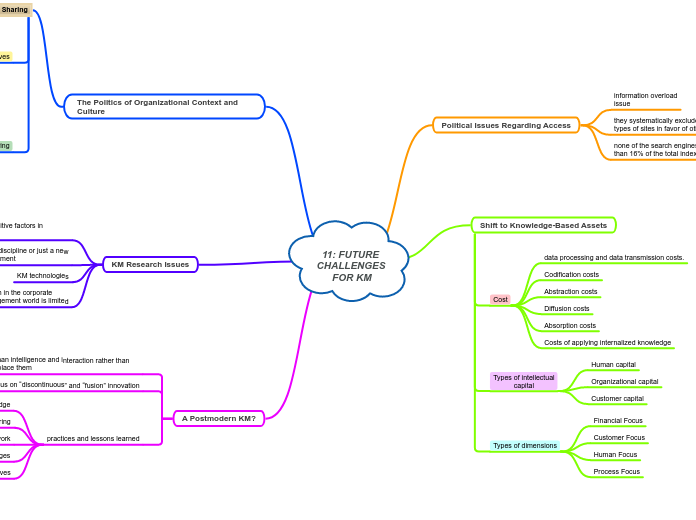11: FUTURE CHALLENGES FOR KM
A Postmodern KM?
practices and lessons learned
Avoid weak incentives
Develop local content in local languages
Network
Promote knowledge sharing
Improve access to information and knowledge
focus on “discontinuous” and “fusion” innovation
fosters human intelligence and interaction rather than trying to replace them
KM Research Issues
empirical research in the corporate
knowledge management world is limited
KM technologies
whether KM is an emerging discipline or just a new
label for Information Management
the role of social and cognitive factors in knowledge codification
The Politics of Organizational Context and Culture
How to Provide Incentives for Knowledge Sharing
efforts to encourage knowledge sharing
Develop leaders and role models
Encourage, support, and sustain communities
Reorganize for sharing
Vary motivations by providing different types of incentives at different levels
Develop trust
Hire people who are willing to encourage knowledge sharing
Incentives
Coercive incentives
Moral incentives
Remunerative incentives
Shift to Knowledge-Based Assets
Types of dimensions
Process Focus
Human Focus
Customer Focus
Financial Focus
Types of intellectual
capital
Customer capital
Organizational capital
Human capital
Cost
Costs of applying internalized knowledge
Absorption costs
Diffusion costs
Abstraction costs
Codification costs
data processing and data transmission costs.
Political Issues Regarding Access
none of the search engines individually indexed more than 16% of the total indexable content of the Web
they systematically exclude certain sites and certain types of sites in favor of others
information overload
issue

